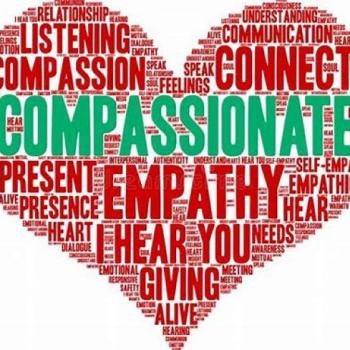What Are Your Intentions?
Many years ago, before my wife and I met, when a date would come to the door to pick her up, they would be met at the door by her brother. He would always be mid-cleaning his favorite shotgun and just happen to answer the door with it still in his hand. All six-foot-six of him would lean down to the face of the prospective date and ask, “What are your intentions with my little sister?”
What is intent, and why is it important? Intent is that deep-seated desire of the will. Many think it comes with a plan; others think it concerns innate character. Either way, it is the kernel, the yet small flame, that drives what we do and how we do it.
We’ve all heard the parable of the man who says he’ll go to the field and work for his father but, instead, goes and does something else. Meanwhile, another is asked to go and work, refuses, but ends up going anyway. This is a parable of intent. The intention is to do the right thing, even when it gets in the way of what we want to do. Some people might call that having “character.”

A Little Story.
I knew a homeless man in San Francisco several years ago. He had been in the Navy and had nowhere to go after his discharge. As life happens, he ended up hooked on several things and became quickly homeless. One night, while in an altered state, he got in a fight with a man coming out of a bar and beat the man severely. So much so that the man ended up in the hospital with injuries that would never heal. The man I knew had kicked and beat the other man over a misunderstanding. In a drunken rage, he broke the other man’s back in three places, leaving him without the use of his legs.
The homeless man didn’t have money. He didn’t have a job, home, or prospects. He had nothing. When the police picked him up, he went with them willingly because he knew what he had done was wrong. He did time for his crime, and when he got out, he felt no malice toward the man he beat for putting him in jail. He knew what he had done was wrong and that he had to pay the consequences.
Even though the man was homeless and begged on the street, he saved some of what was given to him. He saved it for weeks, months at a time. When he saved around $500, he would take the money to the bank or a store and trade the nickels, dimes, quarters, and a single dollar for five crisp $100 bills. He would take the small fortune to the house of the man he beat and wait. The man was home bound, and he didn’t want to just leave the money, so he waited for the man’s small daughter to come home from school. When she came home, the homeless man handed the little girl $500 and told her, “Give this to your papa. Tell him I’m sorry,” and he walked away. He’d never give his name. He’d never ask hers.
This went on for months, years… When the homeless man last came to see the little girl, she had graduated high school the week before. He handed the now young woman the $500 and turned to go. As he began to walk away, she stopped him and said, “Just so you know, my papa forgave you years ago. You really don’t have to do this anymore. Besides, he passed away three months ago.”
The homeless man stopped and turned back to face her. He said, “I want you to know it was never my intent to hurt your papa. I was young, and I was angry at myself. He was just there at the time.”
The young woman said, “Yeah, I think he knew that. Once he admitted he was in the wrong, too, but all it did was make him really angry. Then he took it out on me and my mom. See, he wasn’t a good man. He abused a lot of people, me included.”
“She got really quiet and looked at the homeless man, “He wouldn’t do it physically. He’d never hit or slap anyone. No, he’d hurt people emotionally. And then he took to scamming people for money on the internet and phone. He’d scammed other people just because he could.” The young lady came to the homeless man and took his hand. She had wet eyes and looked at him with a smile. “I look forward to seeing you when you come. You’re one of the few people I’ve ever known who has character and does the right thing, even though it would be easier not to.”
The young lady invited the man in for a good meal and to have a chat, but the man kindly refused. He didn’t want to taint the memory of that little girl he had come to know—now a woman before him.
A year later, I was sitting with a homeless man who was in hospice at the local hospital. He told me all about this little girl and the story you just read. He wished he could see her one last time. So, I found her and told her that he was going to pass soon. I asked if she had a message for him. She did, but she wanted to tell him herself, so I brought her to him. The man’s face lit up like a Christmas tree as she entered the room. I wasn’t privy to the conversation between the two. I can say that she came to see him every day until he passed, and she insisted on being “his family” at the funeral two months later.

What is Character?
Character comes from people who have good intent. It doesn’t matter how old they are, what color they are, what size they are, or how rich they are. Some of our founding fathers, around 250 years ago, said as much about the people who shepherd our then-fledgling country. John Adams warned, “Our Constitution was made only for a moral and religious people. It is wholly and inadequate to the government of any other.”
So, what if our intent, like the injured father, is personal greed? What if we think more about me than we? What if our personal intent is a personal gain over assistance and community? Ben Franklin said it best. “Only a virtuous people are capable of freedom. As nations become corrupt and vicious, they have more need of masters.”
We need to instill in everyone we meet, in everyone we encounter, in the entire population of our 248-year-old republic that only through good intent will we keep our republic. We must look to our “better angels” to live by good character and to insist we are led by good and moral people. Otherwise, Thomas Jefferson will move from being a “founding father” to a “prophet of doom,” stating, “Experience has shewn, that even under the best forms of government those entrusted with power have, in time, and by slow operations, perverted it into tyranny.”
Happy 4th everyone.













